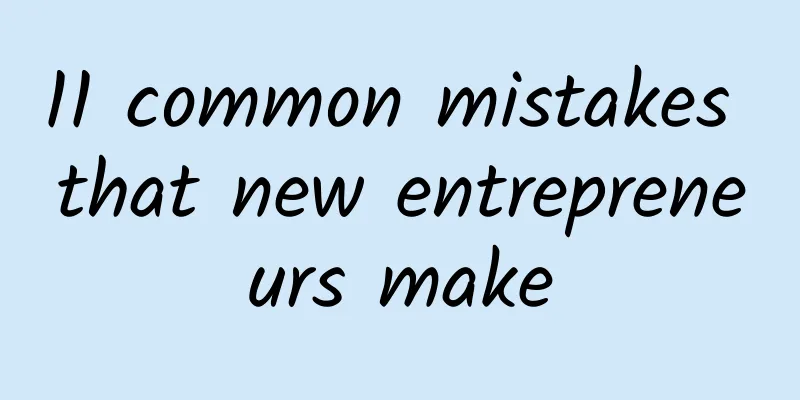11 common mistakes that new entrepreneurs make

|
The process of starting a business is usually full of hardships. If you are a rookie entrepreneur, it is easy to fail. So how can rookies ensure that they will not make stupid mistakes when starting a business for the first time? One way is to learn from the past and see what mistakes others have made. The mainstream American online media BI, through the question-and-answer website Quora, has counted the 11 biggest mistakes that rookie entrepreneurs are most likely to make for readers. 01. Not being honest with yourself “If you’re not honest with yourself, you can’t make critical decisions that will actually improve the company,” said Lucas Carlson, former CIO of CenturyLink, the third-largest telecom operator in the United States. “You’ll make excuses or make up stories to cover up your unwillingness to take responsibility, and even you won’t believe the whole story you’re telling. You need a healthy skepticism to make real progress.” 02. Starting a business for the wrong reasons “You can start a business with great expectations because it’s driven by your desire,” said Rajesh Setty, co-founder of several startups in the U.S. and India. “But if you start a business for the wrong reasons, you’re going to get into trouble sooner or later.” 03. Not keeping an eye on your bank balance “This happens more often than you think,” warns co-founder Murli Ravi, an angel investor and self-taught programmer. “Even if your company has revenue and is profitable, you can still run out of money. Watch out!” 04. Forgetting to lock down intellectual property Jeff Nelson, the developer of Google's Chromebook laptop, said: "For startups, it is critical to lock in intellectual property, including patents, trademarks and copyrights. If a patent dispute occurs, the startup may end up paying a huge price or even not being allowed to sell the product, which is a loss they cannot afford." 05. Micromanaging for too long “I think the biggest mistake first-time entrepreneurs make these days in the SaaS space is micromanaging for too long,” said Jason M. Lemkin, co-founder and CEO of EchoSign, an electronic signature service, and NanoGram Devices, which makes embedded batteries for nanomaterials. “They should let go and let your lieutenants do their thing. Let them make mistakes, and you help correct them. Trust them.” 06. Bad hiring decisions “The team is the most important part of the startup process, and the wrong hire can lead to startup failure,” said Evan Reas, co-founder of software maker Hawthorne Labs. “It’s easy to fall into the startup trap when you hire based on skills, intelligence, and tenacity, which makes you think you’ve hired ‘good enough’ employees, but in fact this can be fatal. If you make a mistake, you can be quickly discarded.” 07. Not focusing on sales “We are a technology and product-driven company first,” said Anand Sanwal, co-founder of business research firm CB Insights. “If I had extra time in the day, I would always tend to build the product. As a result, we spent a lot of time tinkering with the product in the beginning instead of getting out of the office to sell it. This slowness on my part had a big impact on sales, otherwise we should have made more money much earlier.” 08. Not realizing the importance of cash flow "You need 10 to 13 weeks of cash flow to ensure you survive," said Peter Baskerville, who has founded, owned and managed more than 30 businesses. "Keep the cash flowing because it's so important." 09. Lack of contact with customers “Your customers should love your product, or if they don’t, there’s something wrong,” said Brian de Haaff, co-founder and CEO of software company Aha. “You need to find out why, and the only way to find out is to really listen to your customers and really respond to them. Make sure you’re in touch with your customers every day.” 10. Trust the reports you receive Greg Tapper, CEO of Google and two-time Inc. 5000 winner, said: "Nothing is always good. Things will always be broken and mistakes will always occur. But this does not mean it is a bad thing. Setbacks usually make you grow faster." 11. Produce high-end products "Everyone wants their product to always be a 'Maserati,' but usually they don't know how to get there," said Pek Pongpaet, founder of Pictacular.co, which was named one of Time magazine's 50 best websites in 2013. "I always encourage first-time entrepreneurs to build a minimum viable product (MVP) because building a grand product can be a disaster in many ways. First, it can take longer, and second, it's too expensive. And first-time entrepreneurs usually don't have a lot of money or a strong team to support them. Third, they usually build the wrong thing and fail to solve any needs, which requires multiple attempts to succeed." |
<<: Technical dry goods: Statistics on the use of pictures in the project
>>: Ma Huateng teaches you how to win a project that rejected you
Recommend
From 0 to 100——The History of Zhihu’s Architecture Changes
Perhaps many people don’t know that Zhihu is the ...
Maugham's Literature Class: How to Read and Write
Introduction Maugham, author of The Moon and Sixp...
Advertising operations in three major industries: real estate, home decoration and home furnishing, and wedding photography!
As spring comes and flowers bloom, marketing in v...
How to join Baidu AiPurchasing? How to join Baidu Aicaigou promotion?
How to join Baidu AiPurchasing? How to join Baidu...
Online and offline traffic diversion methods and their pros and cons analysis
Competition among Internet products is becoming i...
Going back to the ancient times when there was no Internet, what was the game of "All or Nothing" about?
The recent release of the movie "All or Noth...
How much does it cost to develop a security monitoring applet with functions and a customized smart prevention and control applet?
As people's safety awareness continues to imp...
Middle-aged people die of melanoma. The "effect" of ultraviolet rays is beyond your imagination.
The benefits of ultraviolet light to people go fa...
An article explains the six major operating trends of APP in 2017!
For mobile market APPs, the coverage rate of mobil...
Li Bin revealed that NIO will soon release its fourth product, a sedan
On November 18, NIO released its third-quarter fi...
Case analysis of search promotion in local life service industry!
This article shares with you a search promotion c...
Afraid of losing control of blood sugar and afraid to eat staple food? Take this staple food-friendly recipe, which is both sugar-controlling and delicious
I have diabetes One of the most painful things Do...
Cell Breakthrough: This newly developed diet produces immediate results in 3 weeks!
Compiled by: Gong Zixin Industrial diet High in p...
Cultural and Museum Calendar丨Shanxi is abbreviated as "Jin", which is actually related to it →
Bird statue The bird is the most obvious shape in...
Why do some monkeys have blue testicles? | Weird animal facts
Good-looking eggs are good-looking eggs. Written ...









